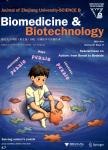A new mutation (1062 del 16) of iduronate-2-sulfatase gene from a Chinese patient with Hunter syndrome
A new mutation (1062 del 16) of iduronate-2-sulfatase gene from a Chinese patient with Hunter syndrome作者机构:Department of Medical Genetics Sun Yat-sen Medical College Sun Yat-sen University Guangzhou 510080 China Department of Internal Medicine the Second Affiliated Hospital Fujian University of Medical Science Quanzhou 362000 China
出 版 物:《Journal of Zhejiang University-Science B(Biomedicine & Biotechnology)》 (浙江大学学报(英文版)B辑(生物医学与生物技术))
年 卷 期:2007年第8卷第8期
页 面:566-569页
核心收录:
学科分类:0710[理学-生物学] 07[理学] 071007[理学-遗传学]
基 金:Project partly supported by the Ph.D. Program of the National Edu-cational Committee (No. 2000044) the Chinese Medical Board(2003), China
主 题:Hunter syndrome Mucopolysaccharidosis typeⅡ (MPSⅡ) Glycosaminoglycan (GAG) Iduronate-2-sulfatase (IDS) Mutation Gene diagnosis DNA sequencing
摘 要:Objective: To identify the mutations of iduronate-2-sulfatase (IDS) gene, to reveal its mutation features, and to establish a basis for genetic counseling and prenatal gene diagnosis of Hunter syndrome. Methods: Urine glycosaminoglycans (GAGs) assay, PCR and DNA sequencing were performed to detect mutation of IDS gene of the patient and his parents. Results: The result showed that the patient was: DS(++), HS(++), KS(-), CS(-), and that both of his parents were negative. A frame-shift deletion mutation (1062 del 16) was identified in exon 7 of the patient s IDS gene. His parents genotypes were normal. Conclusion:The patient s mutation was not inherited by his parents but a novel one. The mutation probably altered the primary structure and tertiary structure of IDS enzyme protein remarkably and lowered the activity of IDS enzyme greatly. Therefore it is supposed to be the direct cause of the disorder.



